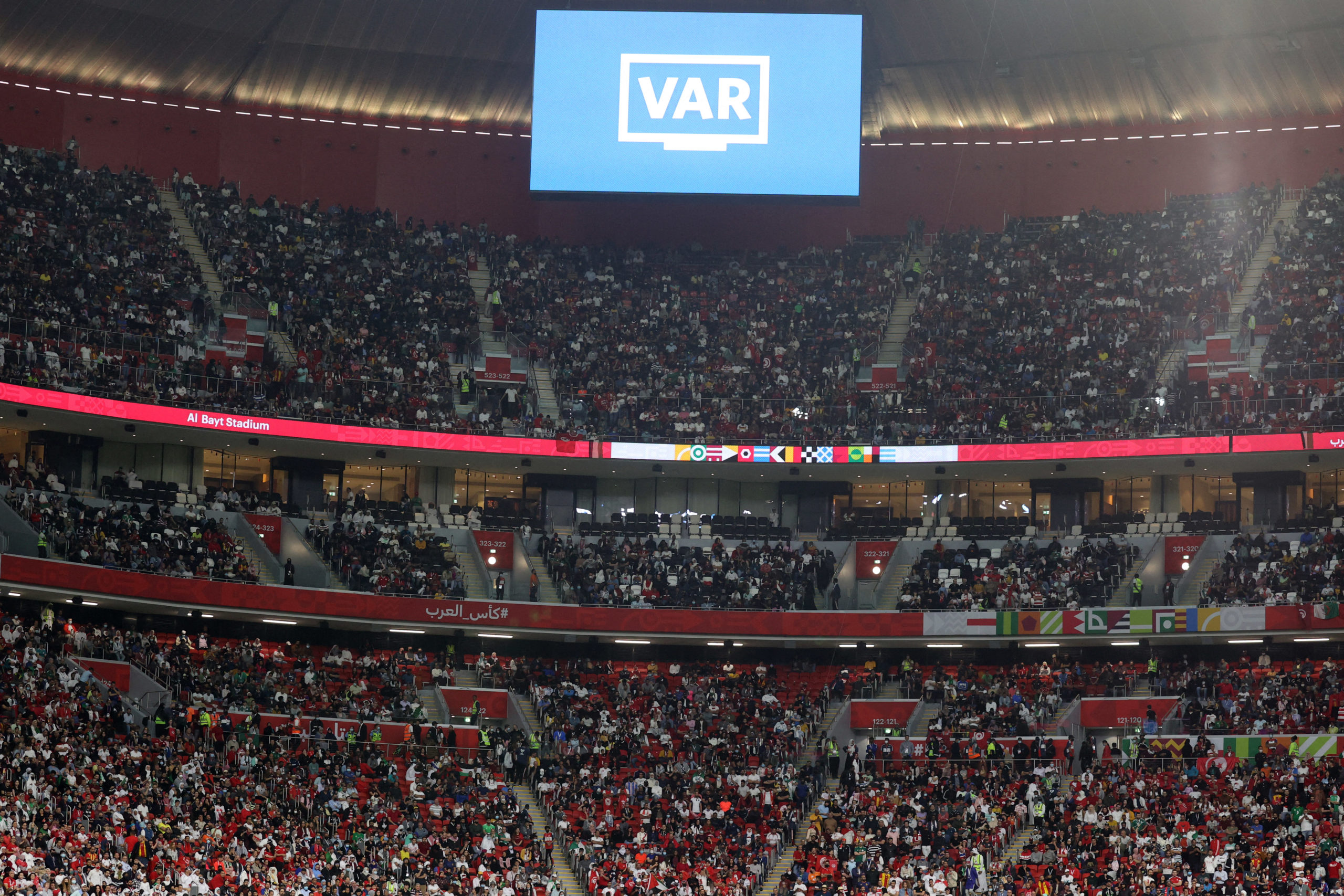
Soccer Football – Arab Cup – Final – Tunisia v Algeria – Al Bayt Stadium, Al Khor, Qatar – December 18, 2021 The big screen displays a VAR review message REUTERS/Amr Abdallah Dalsh
DOHA – As the final whistle ended the game between Tunisia and Oman, two football-mad Brazilian fans set out for the next match of the Arab Cup which was due to start in 90 minutes time.
They were testing a central innovation promised by Qatar’s World Cup 2022 organizers — that fans can take in multiple matches in a single day in the smallest country to host the global showpiece event.
It took two hours for Edmundo Carvalho and Paulinho Rahs to reach Al Bayt stadium, missing nearly half of the Qatar v UAE match. The journey involved two metro lines, a 39km (24 miles) bus ride and a long walk.
Nonetheless, the duo, who attended 20 of the Arab Cup’s 32 matches, enjoyed the tournament that concluded on Saturday, the first major stress test of the gleaming infrastructure that gas-rich Qatar has spent billions on building over the last decade.
“What we found here, people saying good things about our country, receiving us, being warm with us, being nice to us. For me, it’s the best experience ever,” said Rahs, who attended the 2018 World Cup in Russia.
While there were no major snafus at the Arab Cup, attended mostly by fans residing in Qatar according to organizers, there were logistical problems ahead of the expected arrival of some 1.2 million overseas visitors for next year’s World Cup — more than a third of the Gulf state’s population.
Highways flowed smoothly during the 19-day tournament, service on the metro system was rarely disrupted and fears over the Omicron variant of COVID-19 did not stop thousands of fans – many without face masks – from packing into stadiums.
Qatar health authorities reported no significant increases in daily COVID-19 cases, although the country’s first four cases of the Omicron variant were detected on Friday among citizens and residents returning from abroad.
“Overall, I think the stadiums are ready and they are relatively convenient,” said Ronan Evain, executive director of Football Supporters Europe who was in Qatar for the Arab Cup.
“The main problem now is everything that is happening before and after the games,” he said. “The organizers now have one year to fix a certain number of problems, including transport access.”
To allow ample travel time between stadiums during the 2022 World Cup, FIFA will permit fans to buy tickets for only two out of four matches per day during the group stage.
‘My feet still hurt’
To date, three of the eight stadiums have no direct connection to the metro network and fans must board shuttle buses that drop them several kilometers from their destination.
Food, water and toilet facilities were not available on the way to many stadiums.
A mandatory fan ID was abandoned after 165,000 fans spent hours waiting to collect credentials. At stadiums, stewards frequently pointed fans in the wrong direction, and car parks were dark and congested.
Sara, an Iranian fan, walked more than 23km to attend four matches over two days along routes she described as sometimes poorly marked. Her friend, who is disabled, walked alongside her given no accessibility options, like a golf cart.
“My feet are still hurting,” Sara said. “And we didn’t even do any sightseeing, just games”.
Tournament organizers, the Supreme Committee for Delivery and Legacy, did not respond to requests for comment, nor did Qatar Rail, which operates the Doha Metro.
Organizers reported that 75% of fans eschewed public transportation during the Arab Cup, opting for cars or taxis.
Outside the Al Bayt stadium after Algeria beat Tunisia in Saturday’s final, fans sang and danced as a band played favorites by Algerian musicians Rachid Taha and Khaled.
Overhead, a drone light show displayed “See you in 2022”.